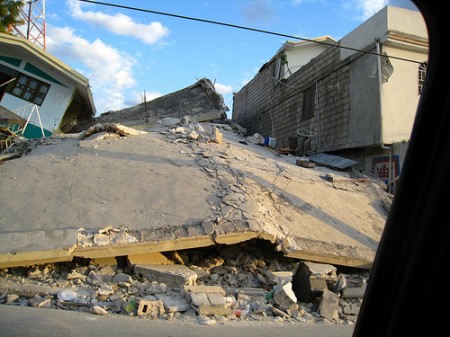
In the critical 72 hours following the devastating earthquake in Haiti, the country lacked almost everything: drinking water, food, basic medical supplies, doctors, lifting equipment, power generators, you name it.
But what it did not lack were journalists. A who’s who of reporters from the great cable networks like CNN and MSNBC were on the ground within hours.
This is not a problem in and of itself, had it not been for the fact that the airport outside of Port-au-Prince was partly damaged and over capacity. This caused long delays for rescue teams trying to land there. Some planes providing aid had to be turned away.
Journalists were in many cases the first people from outside the island to venture into the devastated alleyways of the capital city. Many of them took on an active role helping locals to pull earthquake victims out of the rubble. One CNN journalist reported that he gave his granola bar to a starving earthquake victim.
What these journalists-turned-emergency-rescuers did during those critical hours following the earthquake is nothing but human. If you see suffering and are in the position to help, lending a hand is not only the natural but also the ethical thing to do.
Still, it is my guess that the residents of Port-au-Prince would have preferred to see rescue workers with chain saws instead of journalists with camera equipment coming their way.
Even more questionable was the role of CNN’s medical correspondent Sanjay Gupta. A practicing neurosurgeon, Gupta considers himself a physician first and foremost. When he travels to disaster areas on assignment for CNN, he knows very well that his medical skills will be needed. This was no different in Haiti: within minutes of reporting on the earthquake, he found himself treating an infant suffering from a head injury. Then he turned around asking for antibiotics, which were nowhere to be found.
Of course, Gupta did not bring emergency medication with him because he came to Haiti as a reporter. Again, I am not blaming him for becoming an active part of the story he was supposed to cover. If you see suffering and have the ability to help, you should do so. It is the humane thing to do.
But since Gupta ended up spending most of his time on CNN assignment in Haiti providing urgently needed medical help, CNN could have served the Haitian people better by taking along two fully equipped physicians (who actually had some antibiotics with them) than to fly in their medical reporter with a camera man – keeping in mind that only very few planes were able to land on Haiti’s bottlenecked airport during those crucial hours after the earthquake.
Of course, CNN’s raison d’être is not to help people. It is to report the news. But CNN clearly aspires to do more. This is fine, but, if you truly want to help, then provide some space in your chartered airplane for emergency physicians instead of sensationalizing the improvised emergency relief provided by your medical reporter.
Bob Steele, journalism values scholar at The Poynter Institute and journalism professor at DePauw University puts the Sanjay Gupta dilemma the following way: “If it’s imperative that [Gupta] intervene and help medically, then take him out of his journalistic role and do that. But don’t have him covering the same stories in which he’s a participant. It muddles the journalistic reporting. It clouds the lens in terms of the independent observation and reporting.”
The ethics of journalism center around objectivity and detachment. I doubt that a journalist taking on a dual role – be it as a physician, rescue worker or action hero – can live up to his or her professional code of either role.

